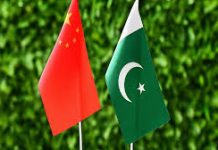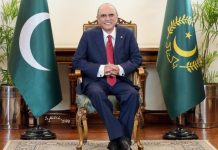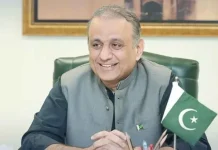ISLAMABAD: Pakistan has agreed terms for a $1 billion loan with two Middle Eastern banks at a 6%-7% interest rate, Finance Minister Muhammad Aurangzeb told Reuters on Tuesday, as the country looks for more financing. “With two institutions we have now gone forward in signing up the term sheet — one bilateral and one for trade [finance],” Aurangzeb said during an interview on the sidelines of the World Economic Forum annual meeting in Davos. The loans were short-term — or up to one year, Aurangzeb added. The finance minister is in Davos to attend the WEF Annual Meeting between January 20 and 25. Global leaders will address key global and regional challenges at the Annual Meeting 2025. The meeting will focus responding to geopolitical shocks, fostering growth to improve living standards, and stewarding a fair and inclusive energy transition. Pakistan aims to boost its finances after securing a $7 billion International Monetary Fund (IMF) bailout in September 2024, with the first review set for late February. “We have the first formal review of the EFF coming through towards (the) end of February,” Aurangzeb said. “I do think we are in good stead for that review.” IMF Extended Fund Facilities (EFFs) provide financial assistance to countries facing serious medium-term balance of payments problems resulting from structural weaknesses that require time to address. In an exclusive article published as part of the World Economic Forum (WEF) annual meeting, Finance Minister Aurangzeb invited the global stakeholders “to support Pakistan’s journey by investing in priority sectors such as agriculture, Information Technology (IT), renewable energy and pharmaceutical Sectors”. The minister highlighted the transformative journey embarked upon by Pakistan in recent years towards economic stabilisation and growth, state-run APP reported on Tuesday. “Confronted with formidable challenges, we implemented decisive reforms to build a robust foundation for sustainable and inclusive development. Today, the results of these efforts are becoming evident, with the economy demonstrating resilience and renewed potential,” he says. Question on the series of economic reforms, he said: “I assumed office as finance minister in 2024, Pakistan faced severe fiscal and monetary pressures and inflation had surged to 38%, straining households and eroding purchasing power.” Aurangzeb said that foreign exchange reserves had dropped dangerously low, barely covering two weeks of essential imports like food and fuel and industrial output had contracted by 10.3%, and GDP growth had plummeted to 0.2%.The compounded effects of COVID-19 and devastating floods causing over $30 billion in damages further tested our resilience. Recognising the gravity of the situation, “we implemented a series of necessary reforms and these included stabilising the exchange rate, tightening fiscal policies, and curbing inflation through targeted monetary interventions. With support from the IMF’s EFF worth $7 billion, the government initiated structural improvements in critical sectors such as energy and taxation. Central to this effort was “Uraan Pakistan”, an economic transformation plan launched in 2024,” he said.He said that this initiative aims to achieve sustainable, export-led 6% GDP growth by 2028 through public-private partnerships, enhanced export competitiveness and optimized public finances and priority sectors include agriculture, energy, textiles, pharmaceuticals and IT. The finance minister said that a pivotal component of ‘Uraan Pakistan’ is our collaboration with the World Bank on a $20 billion initiative targeting health, education, poverty alleviation, investment and climate resilience. He said that this transformative partnership addresses critical challenges such as child malnutrition, educational outcomes and clean energy adoption. By integrating sustainability into our development framework, “we are contributing to global efforts to achieve the United Nations Sustainable Development Goals (SDGs),” he said. The minister said that in July 2024, we introduced a reform-oriented budget with an ambitious goal of raising Rs13 trillion in revenue a 40% increase from the previous year.






















